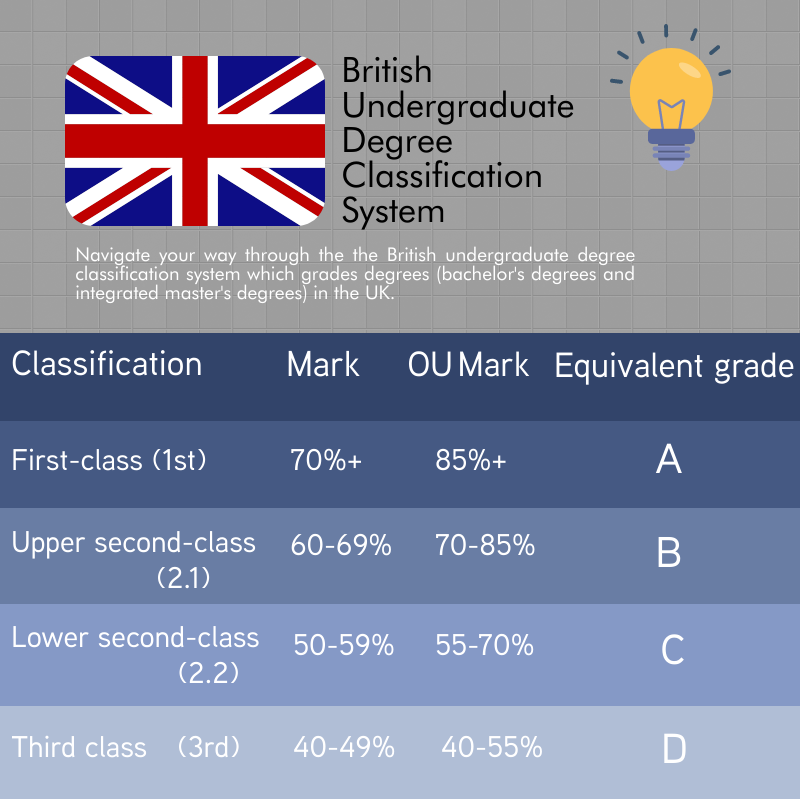What Percentage Is a First Class Degree

The British undergraduate degree classification system is a grading scheme for undergraduate degrees (bachelor's degrees and integrated master's degrees) in the UK. It has been applied in other countries, with slight variations.
When applying to study for an undergraduate degree in the UK, many students are not aware that they have an option to study for a regular degree or a degree with honours. The latter is the most popular degree applied for in the UK. If applying for a bachelor's degree in science, for example, you will see "Bsc (Hons)" as the qualifications you will receive. The "Hons" states that you will be studying an honours degree for that course. If you were to apply for an ordinary science degree, you will see "Bsc".
When you study for an ordinary degree, the aim is to pass and achieve a degree in your subject. If you do not pass, you simply do not get a degree. You will not get a failed degree, but you will fail to achieve a degree. It is similar to a driving test, where passing will gain you a license and failing will not give you a licence.
An honours degree will not only give students a degree, but it will specify your level of achievement and speciality in that subject by awarding classifications. For this reason, it is far more popular, as it gives employers an opportunity to understand a graduate's competency.
The table below shows the different honours degree classifications and their average alternative grading descriptions (it is worth noting that Open University (OU), which is a distance learning university with an open entry policy, has different grade boundaries):

First Class
Commonly known as a "first", a first class is the highest honours degree achievable. Although it is now usually impossible for students to study two full undergraduate subjects, some universities award "double firsts" when a student achieves a first-class degree in two separate subjects, while studying one joint honours degree. The universities of Oxford, Cambridge and Glasgow have been known to award "double firsts". A first-class degree is achievable with very hard work and passion for your subject. Those who achieve this much desired classification are in the strongest position for employment, graduate programmes and acceptance for post-graduate study.
Don't forget that you can keep up to date with exclusive insights, information and advice on our Facebook page.
Upper Second Class
A second-class degree is split into two divisions and the higher of the two divisions is the upper second class, commonly known as 2.1 (pronounced "two-one"). A 2.1 also puts you in a good position for employment, graduate programmes and post graduate study. For some institutions and for some employers, this is the minimum grade acceptable. Like a first-class honours, the number of students achieving a 2.1 has increased significantly in the past few years. According to the Higher Education Statistics Agency, almost 50% of all full-time graduates achieved a 2.1 in the academic year of 2017/18.

Lower Second Class
This is the lower division of a second-class degree. It is commonly known as a 2.2 or "Desmond" (as in Desmond "two-two"). A 2.2 is often the minimum grade required for most opportunities in employment and further education. In the 2017/18 academic year, 19% of students achieved a 2.2.
Third class
Commonly known as a "third", this degree is the lowest honour's degree achievable. Very few graduates achieve a third-class honours. In 2017/18, only 4% of students graduated with a third.
Pass
In some institutions, if an honours student fails to achieve a third class by a small margin, they will be awarded an ordinary degree. Until the 1970s Oxford University awarded fourth class honours.
In recent times, the percentage of students' achieving first-class honours has increased from 26% to 28% according to the Higher Education Statistics Agency.
![]()
What Percentage Is a First Class Degree
Source: https://www.hotcoursesabroad.com/study-in-the-uk/applying-to-university/understanding-undergraduate-grading-system-in-uk/
0 Response to "What Percentage Is a First Class Degree"
Post a Comment